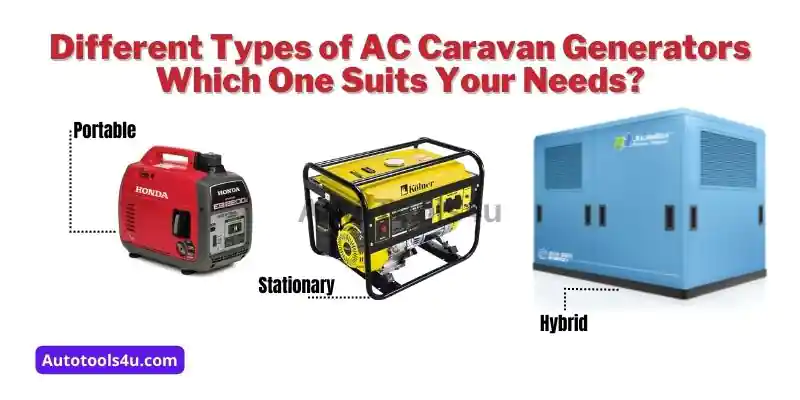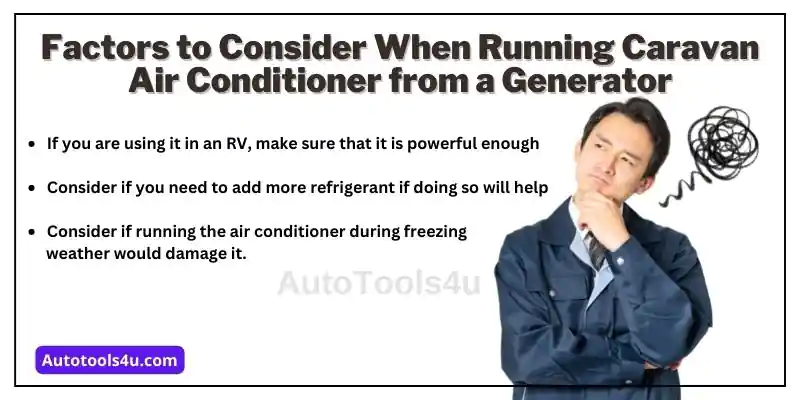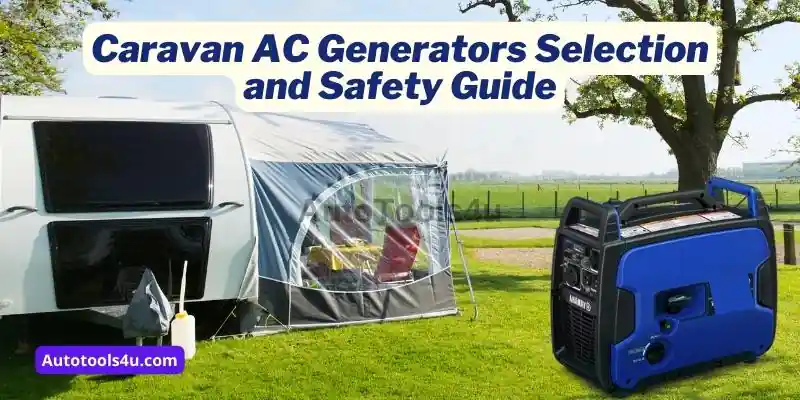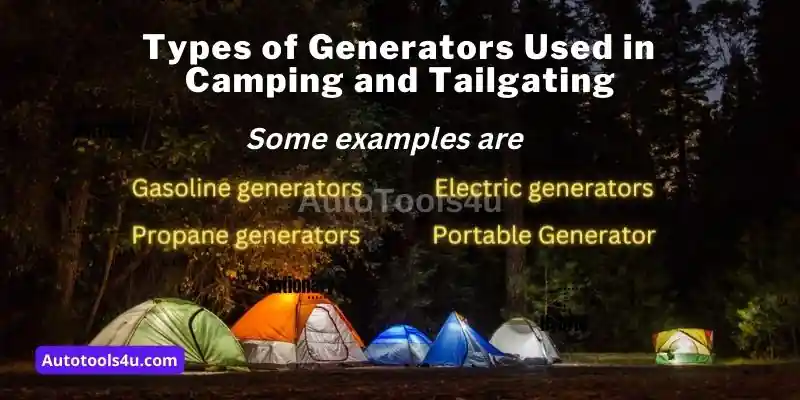If you’re a passionate traveler who loves the freedom and flexibility of caravanning, then having a reliable power source is essential to enhance your experience. In this comprehensive blog, we’ll take you on a journey of understanding and selecting the perfect AC generator for your caravan. From deciphering power requirements and fuel options to exploring different types and sizes of generators, we’ve got you covered. Whether you’re planning to embark on epic road trips, explore remote destinations, or simply enjoy the comforts of home while on the go, choosing the right AC generator is crucial. Get ready to power up your adventures as we delve into the ins and outs of caravan AC generator selection.
An AC caravan generator is a device that uses electro-mechanical principles to create an AC current. A caravan AC generator is a power source that is used to charge the batteries for your appliances while you’re on the go.
A fully charged battery pack can provide many hours of continuous lighting on a single battery charge. There is a timer that allows users to control how many hours they want their lights on at any given time, which extends battery life even further. As such, it’s crucial that you know how to correctly size and selects your caravan AC generator. This guide will provide you with the guidelines for selecting and sizing a caravan AC generator as well as information about safety precautions when using one.
Different Types of AC Caravan Generators – Which One Suits Your Needs? 
The two types of AC Caravan Generators based on power capacity are portable and stationary. Depending on how long you plan to stay in one place, which type would be the best for your needs?
- The stationary generator will be the best choice if you’re going to stay in a permanent location that has electricity. Depending on the size of your camping trip, this generator is a good option because it can produce over 2,000 watts and it’s relatively lightweight.
- The portable generator will be an ideal choice if you’re planning to leave for a mini-vacation for one or two weeks. It is small enough to fit in your car trunk so that you can take it with you when needed. However, since it produces less power than the stationary generator and requires fuel (propane or natural)
- A hybrid generator, also known as a dual-fuel generator, is a type of generator that is capable of running on two different types of fuel. Typically, hybrid generators can operate on both gasoline and propane. This dual-fuel capability provides users with increased flexibility and options for powering their devices and appliances.
Before deciding which type of AC caravan generator is best for your needs, it’s important to consider the size and location of your caravan. If you live in an area with good network strength, high voltage power supply, and close proximity to other buildings with AC power outlets, then you would be better suited for a solar-powered caravan generator or one that has an inverter built into the caravan generator unit itself rather than having to purchase.
There are primarily two functional types of AC generators commonly used in caravans: conventional generators and inverter generators.
Conventional Generators
-
- Conventional generators typically offer higher power output, making them suitable for running multiple appliances simultaneously.
- They are usually fueled by gasoline, diesel, or propane, providing flexibility in fuel options.
- Conventional generators tend to be louder compared to inverter generators.
- They are generally more affordable than inverter generators.
- Conventional generators are well-suited for caravanners who have higher power demands and don’t mind the noise level.
Inverter Generators
-
- Inverter generators provide stable and clean power, making them safe for sensitive electronics and appliances.
- They typically run on gasoline or propane.
- Inverter generators are designed to be quieter than conventional generators, operating at lower noise levels.
- They are often compact, lightweight, and easy to transport, making them ideal for caravanners on the move.
- Inverter generators are known for their fuel efficiency, allowing for longer run times on a single tank.
- Inverter generators are generally more expensive than conventional generators.
- Inverter generators are popular among caravanners who prioritize quieter operation, fuel efficiency, and the ability to power sensitive electronics.
What are Solar Caravan Generators?
Solar caravan generators, often referred to as solar power systems, are a renewable energy solution that harnesses the power of the sun to generate electricity. Rather than relying solely on conventional or inverter generators, solar caravan generators offer an alternative and environmentally-friendly method of powering your caravan. These devices are very portable and noiseless, and very efficient working machines given that enough solar power is available. They comprise of following subparts.
- Charge Controller – A charge controller is an essential part of a solar caravan generator system. It regulates the amount of charge going into the battery bank, preventing overcharging and optimizing battery performance and lifespan.
- Battery Bank – Solar energy generated by the solar panels is stored in a battery bank for later use. This allows for continuous power supply during times when sunlight is not available or during the night.
- Inverter – An inverter converts the DC electricity stored in the battery bank into alternating current (AC) electricity, which can power the appliances and devices in your caravan.
- Monitoring System – Some solar caravan generators come with a monitoring system that allows you to track the performance and energy production of your solar panels, as well as monitor the state of charge of your batteries.
The benefits of solar caravan generators include their renewable nature, reduced reliance on fossil fuels, and the ability to generate power silently and without emissions. However, it’s important to note that solar caravan generators have limitations, such as reliance on sunlight availability and the need for adequate sunlight exposure to generate sufficient power.
Factors to Consider When Running Caravan Air Conditioner from a Generator 
The need for a portable AC unit is growing because of the increasing demand for energy. Caravan AC units are great because they can be used to cool a large area and are easy to carry from one place to another.
Outdoor units powered by generators have some additional needs that need to be considered when purchasing them. They require periodic maintenance, the gas tank should not be overfilled, and buyers should understand the noise levels coming from the unit itself. You need to consider a few factors when running your caravan air conditioner from a generator.
Consider these factors before you decide to run your caravan air conditioner from a generator:
- Check the power requirements of your air conditioner and ensure that the generator’s capacity is sufficient to handle the load.
- Air conditioners typically have a starting power that is higher than their running wattage, so ensure that the generator can handle the initial surge of power during startup.
- Ensure that the generator provides a stable and clean power output suitable for powering sensitive electronics like air conditioners. Inverter generators are often recommended for their ability to deliver clean power and handle the fluctuating demands of air conditioners.
- Ensure proper ventilation for both the generator and the air conditioner. Generators produce exhaust gases that need to be safely vented, and air conditioners require proper airflow to operate efficiently. Maintain adequate spacing and ventilation to prevent overheating and ensure the generator and air conditioner can function optimally.
- If using an inverter generator, ensure that the battery bank is properly charged and maintained.
- If you are using it with an engine-driven compressor, make sure that the engine is big enough to support the extra load
- Consider if you need to add more refrigerant if doing so will help
Quick Summary
To summarize, There are many different types of generators used in camping and tailgating. Generators can be used for power, light, heat, entertainment, safety or to keep people or animals cool. Some examples are:
– Gasoline generators: These are the most common type of generators in camping and tailgating. They usually require gasoline to start up.
– Propane generators: These are lighter than gas and cheaper than electricity (they use propane instead of electricity). Just make sure that you have a regulator to control the flow of gas if you use them to cook on your campfire with an open flame.
– Portable Generator: A portable generator is usually much smaller than a standard generator. They have less power and may not be able to start multiple refrigerators or air conditioning units. They are mainly meant for cold weather use but may also serve as backup for larger generators in case of emergency in milder weather conditions.
– Solar Power Generator Systems: These are newcomers in the market and are compact and noiseless systems, combining a lot of electronics and batteries together in a nice package, of course, you will need solar panels to work with them.
When choosing an AC generator for your caravan, there are several important factors to consider. These factors will help ensure that the generator meets your power requirements, budget, operates safely, and enhances your overall caravanning experience.

